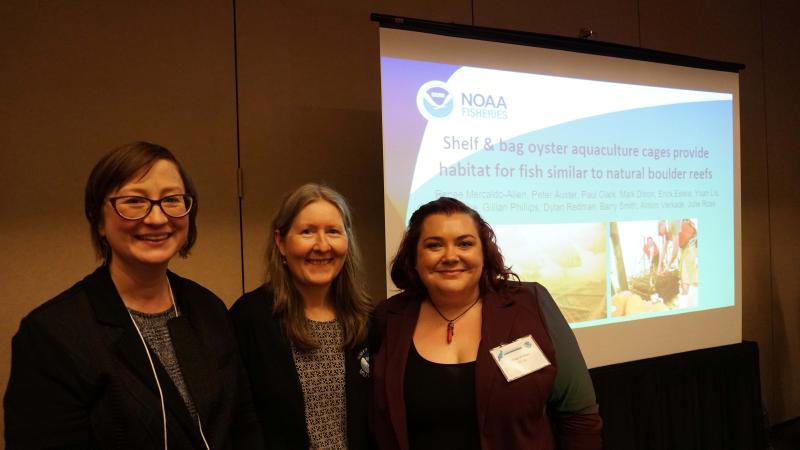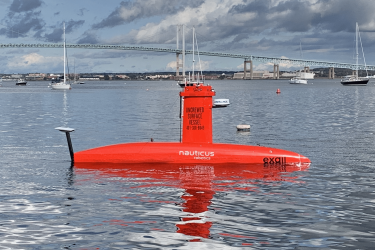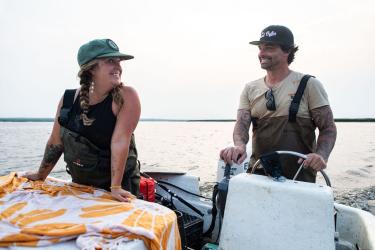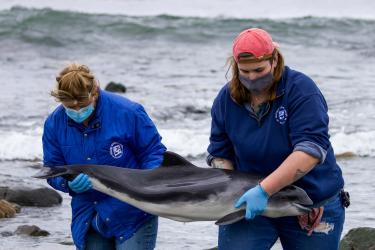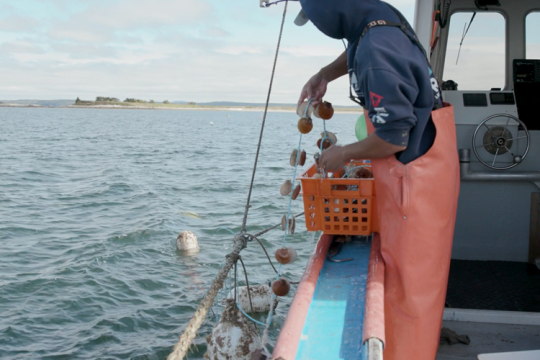After two pandemic postponements, the long-awaited Northeast Aquaculture Conference and Exposition and 41st Milford Aquaculture Seminar was held April 27–29 at the Holiday Inn by the Bay in Portland, Maine. More than 500 aquaculture industry leaders, scientists, and ecosystem managers gathered for the biennial meeting, representing 20 U.S. states and six countries. More than 130 growers attended, along with nearly 60 students. NOAA Fisheries was a sponsor of the meeting. The energy and enthusiasm for all things aquaculture was palpable in Portland.
“The industry is growing and it’s exciting to see the number of young folks getting involved, which bodes well for the future,” said Bob Rheault, Director of the East Coast Shellfish Growers Association. “I continue to be awed by the pace of innovation, and the creativity of our community.”
Conference Highlights
During the opening plenary, NOAA Office of Aquaculture Director Danielle Blacklock introduced several new resources available to growers and the public. These included:
- Interagency Aquaculture Regulatory Efficiency Plan and Science Coordination Plans
- State-by-state permitting inventories
- New federal aquaculture permitting guide.
She also gave an update on Aquaculture Opportunity Areas, defined areas that NOAA is evaluating for potential commercial aquaculture suitability. NOAA has released Aquaculture Opportunity Area atlases for Southern California and the Gulf of Mexico. These detailed spatial analyses use more than 200 data layers to identify potential options for AOAs. They will be considered in the development of Programmatic Environmental Impact Statements, along with public input and other information, to complete the final steps in identifying AOAs for these regions.
Among 35 special sessions and more than 160 presentations over 2 days, a few themes loomed large this year:
- Developing seaweed and scallop aquaculture industries
- COVID and climate impacts
- Diversity and inclusion
- Building the aquaculture workforce
- Social license to farm
Buzz About Kelp and Sea Scallop
Kelp was clearly having a moment, with a seaweed farmer panel and sessions on seaweed farming, processing and product development, and food safety.
"Maine is a focal point for the domestic seaweed aquaculture industry. The interest in seaweed presentations and events in Portland built off of that,” explained Jaclyn Robidoux, a member of Maine Sea Grant’s marine extension team. “We have over 30 kelp farms on our coast and the conference timing coincided with our kelp harvest season, as well as Seaweed Week, a state-wide food and drink festival featuring seaweed specials in local restaurants, bars, and breweries, as well as seaweed networking hours and product launches."
Products on hand included Seacharrones, an addicting (and vegan) kelp puff snack made by conference sponsor Blue Dot Kitchen.
Sea scallop aquaculture also garnered quite a bit of interest. A pre-conference workshop and two sessions were devoted to farming sea scallops—one on hatcheries and spawning, and one on grow-out techniques.
The Resilience of the Aquaculture Industry
Several sessions addressed challenges related to recovering from COVID market disruptions and facing climate change. COVID recovery presentations focused on market impacts, the rise of direct sales, and building resilience in the industry.
Other sessions emphasized the longer term challenge of climate risks including:
- Increasing rate of large rainfall events in New England
- Increase in intense storm frequency
- Ocean acidification
Increasing temperatures are also allowing range expansions for pests, predators, algal blooms, and diseases. Presentations and an interactive discussion session focused on sharing climate resilience strategies.
Diversity, Inclusion, and Building the Aquaculture Workforce
Women represent an estimated 70 percent of the global aquaculture industry. This year’s conference recognized the importance of a diverse and inclusive industry by hosting a women and minorities in aquaculture networking event for the first time.
"I was honored to be involved with an event that's rarely done at aquaculture conferences,” said Imani Black, founder and CEO of Minorities in Aquaculture, a non-profit providing educational opportunities to bridge the gap between minority women and sustainable seafood. “Through this conference, we were able to grow our partnerships, engagement/outreach, and our overall presence supporting Maine aquaculture, especially our support for Maine’s women oyster farmers."
Along with diversity, several sessions were devoted to growing the aquaculture workforce. Christian Brayden, a project manager with the Maine Aquaculture Association, said, “Workforce development is critical for the future of Maine's aquaculture sector, which is why the Maine Aquaculture Association is committed to collaborating with partner organizations to train and prepare the next generation of seafood farmers.”
Telling the Story of Aquaculture
Finally, several sessions highlighted the increasing importance of communications and education in building public trust in aquaculture. Sebastian Belle, Executive Director of the Maine Aquaculture Association, stressed, “As farmers, we haven’t been great at telling our story. We’ve been focused on growing our farms and developing our workforce. But if we don’t tell our story, others will tell it for us.”
A panel about the role of industry partnerships in engaging the public with aquaculture literacy featured chefs, several NOAA aquaculture professionals, and an aquaculture business owner. Another session was devoted to aquaculture’s social license to operate, featuring presentations on proven strategies for building public support.
Lisa Milke, Acting Chief of NOAA Fisheries’ Ecosystems & Aquaculture Division and a member of the conference organizing committee, reflected, “After multiple postponements, we were very happy to be able to gather and share information and ideas.” The next combined conference will be held in January 2024, while the 42nd Milford Aquaculture Seminar will be held in January 2023.
